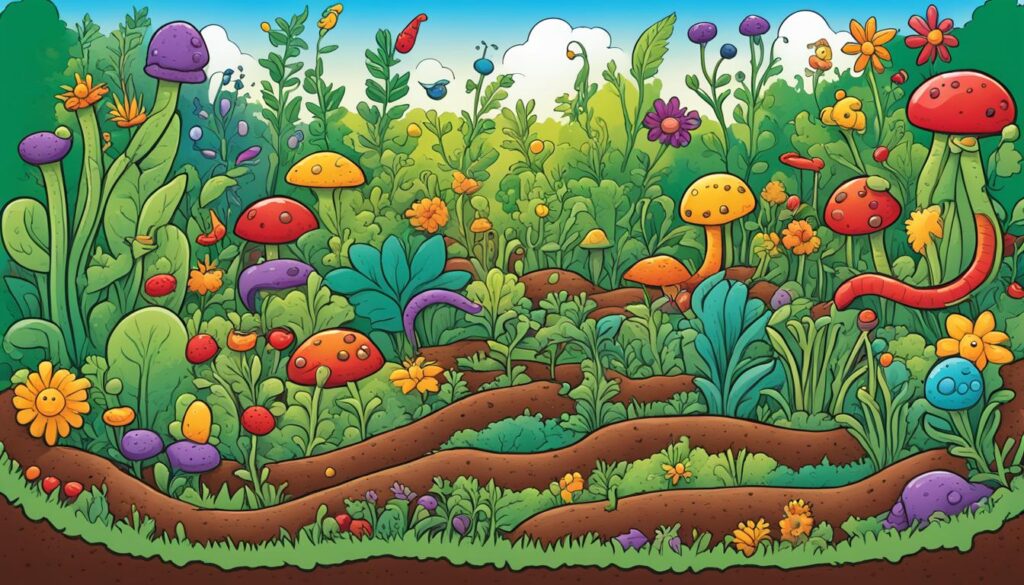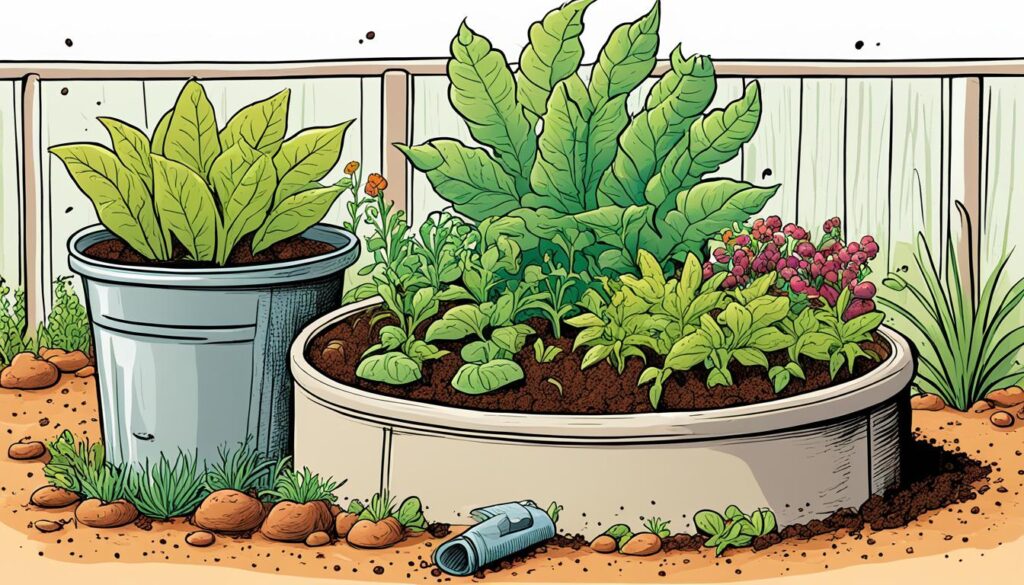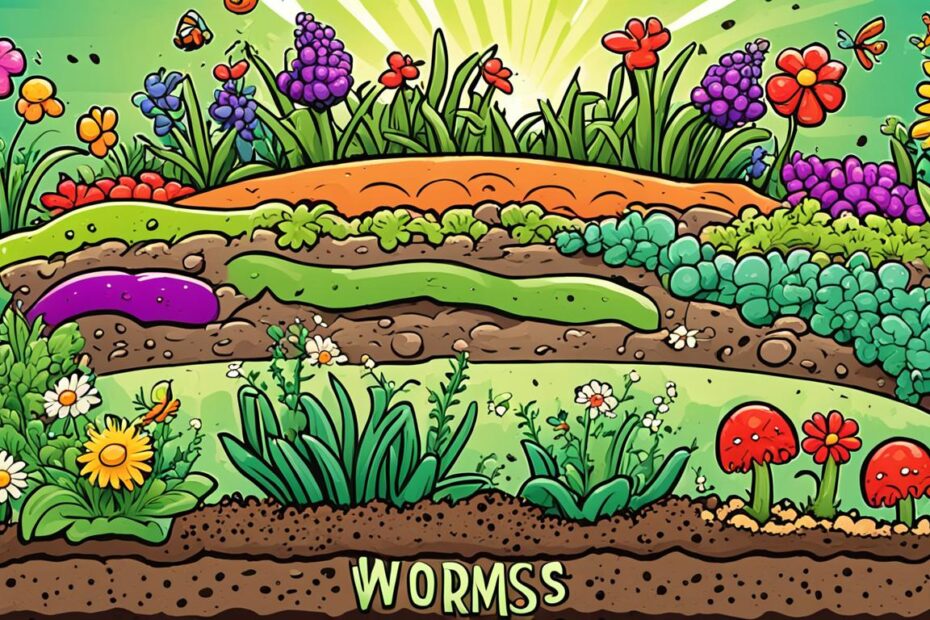Are you looking for a secret ingredient to maximize the potential of your garden? One that can boost soil health, promote plant growth, and lead to abundant harvests? Look no further than the humble worm. Yes, these hardworking creatures can revolutionize your garden in ways you never imagined.
Key Takeaways
- Worm castings are packed with essential nutrients that plants need to thrive.
- They improve soil texture and act as a filter against toxins.
- Worm castings retain moisture, making them perfect for water-starved regions.
- They enhance soil fertility, eliminating the need for synthetic fertilizers.
- Worm castings improve soil aeration, promoting root health and water infiltration.
Nutrient Density and Soil Enrichment
When it comes to cultivating a thriving garden, nutrient density and soil enrichment are key factors in achieving abundant crop yield. Organic farming and sustainable agricultural practices promote a holistic approach that not only prioritizes crop growth but also considers the long-term health of the soil and the surrounding ecosystem. One powerful ally in this pursuit is the use of worm castings, a natural and eco-friendly soil amendment.
Worm castings, also known as vermicompost, provide rich nutrients to the soil, enhancing its fertility and promoting the growth of healthy plants. These nutrient-rich castings are the result of the hard work of earthworms, who breakdown organic matter and transform it into a nutrient-dense form that is easily absorbed by plants. Unlike synthetic fertilizers, which may disrupt the natural balance of the soil and harm beneficial organisms, worm castings support sustainable agriculture by nourishing the soil in a harmonious and environmentally friendly way.
What truly sets worm castings apart is their impressive nutrient density. Even in small amounts, worm castings can significantly enrich the soil and enhance crop yield. This means that you can achieve optimal results while using fewer inputs, reducing both your environmental impact and the need for additional fertilizers. By incorporating worm castings into your gardening practices, you can create a nutrient-rich soil environment that fosters strong and healthy plants.
Enhancing Crop Yield with Worm Castings
Research has shown that worm castings can have a profound impact on crop yield. Their natural composition, containing a balanced blend of essential nutrients, promotes balanced growth and increases the overall resilience of plants. This can result in larger harvests and a higher quality of produce.
To showcase the effectiveness of worm castings in enhancing root development and crop yield, here is a comparative analysis of a study conducted on two garden plots:
| Garden Plot A (Without Worm Castings) | Garden Plot B (With Worm Castings) |
|---|---|
| Lower nutrient content in the soil | Improved nutrient density in the soil |
| Suboptimal crop growth | Enhanced root development and robust plant growth |
| Inconsistent crop yield | Steady and abundant crop yield |
As demonstrated in the table above, the introduction of worm castings in Garden Plot B resulted in improved soil nutrient content and enhanced root development. These factors directly contributed to more vigorous plant growth, ultimately leading to a substantial increase in crop yield.
Growing in Harmony with Nature
Cultivating a garden with worm castings as a soil amendment aligns with organic farming principles and sustainable agricultural practices. By harnessing the power of nature through the use of earthworms and their castings, gardeners can minimize their reliance on synthetic fertilizers and artificial substances that may harm the environment.
Moreover, worm castings contribute to the long-term health and resilience of the soil. Their organic composition improves soil structure, increasing water retention capacity and facilitating better aeration. This promotes a balanced soil ecosystem that supports the growth of beneficial microorganisms, earthworms, and plant roots, ensuring the sustained health of your garden.
The use of worm castings not only provides immediate benefits in terms of enhanced nutrient density and improved crop yield but also contributes to the long-term sustainability of your garden. By embracing this natural and eco-friendly amendment, you can create a thriving garden that harmonizes with nature and brings you the joy of bountiful harvests.

Soil Aeration and Texture Improvement
When it comes to cultivating a thriving garden, soil health is essential. Worm castings play a crucial role in improving soil aeration and texture, which directly impact root health, water infiltration, and overall plant growth.
“The soil is the stomach of the plant, and its health is the key to vibrant growth.” – Peter Andrews
Worm castings, rich in organic matter, create channels within the soil, allowing for better oxygen circulation to the roots. This aeration process rejuvenates the soil, providing the necessary air supply that roots need to absorb nutrients effectively. With improved oxygen levels, roots thrive, resulting in stronger plants and abundant harvests.
But that’s not all. The texture of the soil also plays a vital role in plant development. Integrating worm castings into the soil improves its structure, making it looser and more crumbly. This enhanced texture promotes better root penetration and allows for optimal nutrient absorption.
Furthermore, the improved soil structure facilitates water infiltration. Water can penetrate the soil easily, ensuring that plants receive the necessary hydration without the risk of waterlogging. This is particularly crucial for root health as excessive water can lead to rot and other diseases.
To illustrate the impact of soil aeration and texture improvement, here is a table outlining the differences between soil treated with worm castings and untreated soil:
| Characteristics | Soil Treated with Worm Castings | Untreated Soil |
|---|---|---|
| Aeration | Improved due to the presence of channels created by earthworms | Poor, resulting in limited oxygen circulation |
| Texture | Loose and crumbly, promoting root penetration and nutrient absorption | Compacted, inhibiting root growth and nutrient uptake |
| Water Infiltration | Enhanced, allowing water to penetrate easily | Poor, leading to waterlogging and potential root damage |
By incorporating worm castings into your garden, you can create an environment that supports healthy root development, optimal nutrient absorption, and efficient water management. Now, let’s explore how worm castings contribute to moisture retention and drought resistance in the next section.
Key Takeaways:
- Worm castings improve soil aeration, allowing for better oxygen circulation to the roots.
- The enhanced soil structure promotes root penetration, nutrient absorption, and water infiltration.
- Integrating worm castings into the soil creates a fertile environment for healthy root development and overall plant growth.
Moisture Retention and Drought Resistance
In water-starved regions, maintaining adequate moisture in your garden can be a challenge. However, worm castings offer a solution that promotes moisture retention and drought resistance, ensuring the resilience of your plants even in challenging conditions.
One of the remarkable qualities of worm castings is their ability to help the soil retain moisture. The granular structure of the castings creates tiny air pockets that act like sponges, holding onto water and preventing it from evaporating too quickly. This moisture retention ability is especially valuable in regions where water resources are limited.
By improving water retention, worm castings contribute to the resilience of your plants. When facing drought or water scarcity, plants with access to moisture-retaining soil have a higher chance of survival. The roots can draw upon the stored water in the soil, reducing their dependence on regular watering and increasing their ability to withstand periods of prolonged dryness.
Furthermore, the moisture retention provided by worm castings improves the overall health and vitality of your plants. When plants have consistent access to water, they can carry out essential physiological processes efficiently, such as nutrient absorption and photosynthesis. This promotes robust growth and helps plants develop a deeper, stronger root system, further enhancing their resilience against drought.

In addition to their moisture retention properties, worm castings also contribute to the overall soil health and structure. They improve soil texture and increase its ability to hold and distribute moisture effectively, creating an optimal environment for plant growth.
Parenting Table:
| Benefits of Worm Castings for Moisture Retention and Drought Resistance | How it Helps |
|---|---|
| Enhanced moisture retention | The granular structure of worm castings holds onto water, preventing quick evaporation. |
| Increased plant resilience | Plants can draw upon the stored water in the soil, reducing their dependence on watering and increasing their ability to withstand drought. |
| Improved overall plant health | Consistent access to water promotes efficient physiological processes and robust growth, contributing to plant resilience. |
| Soil health and structure improvement | Worm castings improve soil texture and its ability to hold and distribute moisture, creating an optimal environment for plant growth. |
Mineral Nutrients and Trace Elements
In addition to improving soil fertility and promoting plant growth, worm castings are a rich source of vital mineral nutrients and trace elements that nourish your plants. These nutrients play a crucial role in supporting plant development and overall health.
The mineral nutrients present in worm castings include:
- Nitrogen: an essential nutrient for promoting leafy growth and strong stems.
- Phosphorus: important for root development, flower formation, and fruit production.
- Potassium: aids in overall plant vigor, disease resistance, and the production of sugars and starches.
These mineral nutrients are essential for the growth and vitality of plants. By incorporating worm castings into your garden, you can ensure that your plants have access to these vital nutrients, reducing the need for synthetic fertilizers.
In addition to mineral nutrients, worm castings also contain crucial trace elements, including:
- Iron: necessary for the formation of chlorophyll, which is responsible for the green color in plants.
- Zinc: essential for enzyme activity and plant hormone production.
- Copper: aids in photosynthesis and the production of essential proteins.
These trace elements are required in smaller quantities but are no less important for plant growth and development. By enriching your soil with worm castings, you can provide your plants with these essential trace elements, ensuring their overall health and resilience.
| Mineral Nutrient | Function |
|---|---|
| Nitrogen | Promotes leafy growth and strong stems |
| Phosphorus | Encourages root development, flower formation, and fruit production |
| Potassium | Aids in plant vigor, disease resistance, and sugar/starch production |
| Iron | Necessary for chlorophyll formation and plant color |
| Zinc | Essential for enzyme activity and hormone production |
| Copper | Aids in photosynthesis and protein production |
Expert Insight:
“The mineral nutrients and trace elements found in worm castings provide a complete and balanced nourishment for plants. By incorporating worm castings into your soil, you can reduce the need for synthetic fertilizers while promoting healthy and sustainable gardening practices.”
Stay tuned for the final section of our blog post, where we conclude with a summary of the benefits of using worm castings in your garden.
CLICK HERE TO CHECK OUR RECOMMENDED PRODUCTSConclusion
Unlock the true potential of your garden by harnessing the power of worms. Worm castings offer a wealth of benefits that contribute to soil health, plant growth, and sustainable gardening practices. Incorporating this natural powerhouse into your gardening routine will yield abundant harvests and a thriving garden ecosystem.
One of the key advantages of worm castings is their ability to enrich the soil. Packed with essential nutrients, they provide the nourishment that plants need to flourish. By improving soil fertility, these castings eliminate the reliance on synthetic fertilizers, promoting organic farming and sustainable agricultural practices.
But it doesn’t stop there. Worm castings also enhance soil texture, allowing for better aeration and root development. Their moisture retention properties are particularly valuable in water-starved regions. With improved water infiltration, your plants will have the resilience to withstand drought conditions and thrive in even the harshest environments.
Embracing worm castings is not only good for your garden but also for the environment. Their eco-friendly nature and safety make them a natural choice for sustainable gardening. By incorporating these castings into your garden, you can unlock your garden’s full potential and enjoy the benefits of healthy soil, robust plant growth, and bountiful harvests—turning your garden into a vibrant haven of sustainable beauty.
FAQ
Are worms good for gardens?
Yes, worms are incredibly beneficial for gardens. They improve soil health, aerate the soil, enhance moisture retention, and provide essential nutrients to plants, promoting their growth and overall garden success.
How do worms improve soil health?
Worms improve soil health by producing nutrient-rich castings, which enrich the soil and enhance its fertility. These castings eliminate the need for synthetic fertilizers, promote sustainable agriculture, and support the growth of healthy plants.
Do worms help with root health in gardens?
Absolutely! Worms play a crucial role in improving root health in gardens. They aerate the soil, allowing oxygen circulation to the roots, and improve soil texture, facilitating healthy root development and overall plant growth.
How do worms contribute to moisture retention and drought resistance?
Worms help improve moisture retention in gardens by enhancing the soil’s water-holding capacity. This is especially valuable in water-starved regions where maintaining adequate moisture levels can be challenging. By retaining moisture, worms promote plant resilience and enable plants to thrive even in drought conditions.
What nutrients do worms provide to the soil?
Worms provide an array of essential nutrients to the soil, including nitrogen, phosphorus, potassium, and important trace elements like iron, zinc, and copper. These nutrients support plant development, reduce the need for synthetic fertilizers, and contribute to nutrient-dense and sustainable gardening practices.
How can incorporating worms into my garden benefit me?
By incorporating worms into your garden, you unlock its full potential. Worms improve soil health, enhance root health, increase moisture retention, and provide essential nutrients to plants. This results in abundant harvests, promotes sustainable gardening practices, and ultimately brings you joy and satisfaction as a gardener.
